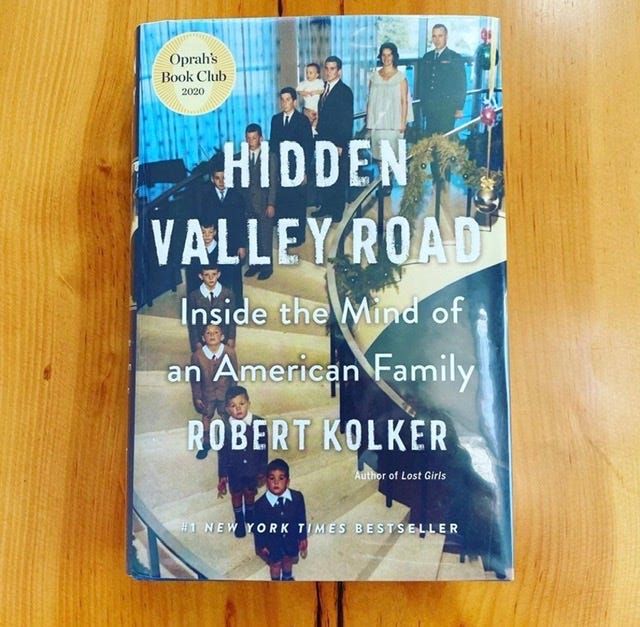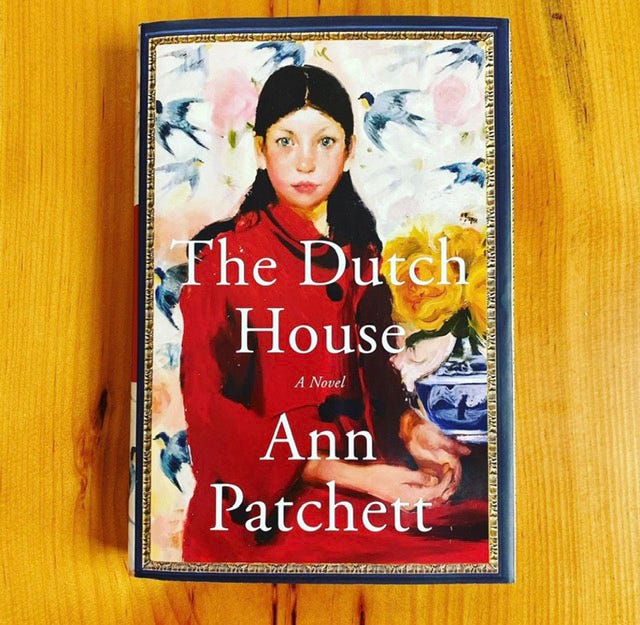What to Read Next (No. 152): it’s all about family
Whether for better or for worse, the holidays inevitably bring family to the forefront of our attention. As the years go by and the children keep coming (our third’s due date, towards the end of January, is quickly approaching), stories about families interest me more and more. It makes sense, of course; as we age and our circumstances change, so do our tastes. While coming-of-age stories were really motivating and entertaining in my 20s, nowadays that sort of story mostly makes me feel tired. Hence this “family” edition of the newsletter.
Let’s get right to it.
Hidden Valley Road: Inside the Mind of an American Family by Robert Kolker
Published: 2020 | Pages: 340
The quality of empathy in a writer—whether in fiction or non-fiction—is something that I’ve come to look for more and more as a reader. In my interview with Paul Tremblay, who takes the idea seriously, he said this:
“Sympathy is shallow, easy, and akin to rooting for the home team. Sympathy too often boils down to ‘I sympathize with that character because they look and act like me.’ Empathy is harder but it's more rewarding, more human, and more humane; the want to understand someone who isn't you.”
Hidden Valley Road weaves history, science, crime, and biography into a majestic story about schizophrenia and the powerful, infuriating, unbreakable bonds of family.
The Galvin family of Colorado Springs was always a little quirky. They were avid falconers, made friends with alcoholic priests, and kept cranking out kids. There were 12 children born between 1945 and 1965—10 boys to start, with two girls coming at the end. Though there were warning signs in childhood, it was when they reached adulthood that the mental health problems became most obviously apparent. In fact, six of the Galvin boys would be diagnosed with schizophrenia, a disease which ultimately came to define the life of everybody in that household.
With a topic like this, it would be easy for the family trials to become something to leer at. But Kolker digs deep and explores the inner workings of nearly every family member and even schizophrenia itself, which manifests as a particularly nefarious constellation of symptoms that aren’t the same between any two patients. Kolker worked especially hard to respect the Galvins, let the living children process their life in real time, and not pass judgment on anyone’s choices. This is among the most empathetic books I’ve ever read.
Hidden Valley Road admittedly carried extra significance for me. My grandmother was diagnosed with schizophrenia in her 20s; I’ve seen the impact it has on a family, and I’ve not seen an author be able to capture that reality in a more meaningful way that Robert Kolker. It was an easy choice to include in my list of 2020 favorites.
The author himself writes a better summation than I could hope to:
“[This book] is about, even after the worst has happened in virtually every imaginable way, finding a new way to understand what it means to be a family.”
Reader warning: There is a bit of physical/sexual abuse within the family. Perhaps skip this one if that sort of content is triggering.
The Dutch House by Ann Patchett
Published: 2019 | Pages: 337
I’ve read three of Ann Patchett’s novels. If you were to ask me what they were about, I could answer for each of them with just a sentence or two. They aren’t plot-heavy books. And yet, she manages to keep the pages turning until the very end. I liken her writing to a fresh cup of tea—soothing, delicious, calm, refreshing. Even the more dramatic aspects of her storylines are written with such elegant prose that it doesn’t feel tense. As with Bel Canto and State of Wonder, Dutch House was a completely enjoyable book.
Guided by our narrator Danny, the reader treks through decades in the life of the Conroy family. Cyril, the patriarch, becomes enormously wealthy and buys a lavish glass house outside of Philly. Mom runs off, Dad re-marries, and siblings Danny and Maeve have to work through the seemingly never-ending ramifications of adding new family members to a fancy old house. As you can probably imagine, it doesn’t go so smoothly.
Like she often does, Patchett explores the nature of human relationships, especially, in this one, our family ties. What happens when our history is strongly anchored to place? How does an absent parent change the equation? How can nostalgia—that ethereal presence—have such a hold over our feelings and experiences?
I know that it doesn’t sound like an exciting read. I get that. But what Patchett really excels at is delving into these deep questions while maintaining an easy-reading and surprisingly page-turning flow.
Our book club rather enjoyed it, with everyone giving it right around 4/5 stars. Interestingly, though, the conversation wasn’t as robust as usual. The Dutch House was just a really nice read that we collectively had very few complaints about. Another thumbs up for Patchett.
That’s all for me this week. I’d love to hear what you’re reading as we head into Christmas. I always put way too much thought into my holiday reading, usually combining a thick history book that I’ve been looking forward to with a light, Christmas-themed novel. Thank you, as always, for your time and inbox space.
-Jeremy


